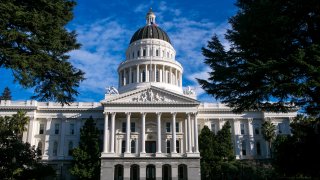
With the coronavirus spreading faster than public health officials can track it, California could become one of the first states to mandate that businesses notify workers and state officials any time an employee has been exposed to the disease.
A bill moving through the state's Democratic-controlled state Legislature would require companies to notify people no later than 24 hours after they knew or should have known about an employee's exposure to the virus. Violators could be charged with a crime and fined $10,000.
California law already requires companies to report deaths and serious incidents that occur in the workplace, but it's only recommended that they report infections, according to Assemblywoman Eloise Gomez Reyes, a Democrat from Grand Terrace and the author of the bill.
“If we are serous about getting this pandemic under control, we must get serious about creating a comprehensive reporting framework,” Reyes said.
Get a weekly recap of the latest San Francisco Bay Area housing news. Sign up for NBC Bay Area’s Housing Deconstructed newsletter.
Last month, Virginia became the first state to approve temporary workplace safety rules that require notifications when a worker tests positive for the virus. But California's proposal would go further by requiring notification anytime an employee has been exposed to the virus.
Business groups, including the California Chamber of Commerce, are lining up against the bill, arguing it will be impossible to comply with it. But California's powerful labor unions are pushing hard for the bill as more people are returning to work. They include Laurinda Fiddler, who works at Disneyland and is a member of the United Food and Commercial Workers union.
“We are exposed by people from all over the world. And if our company would at least report so that we know that we've been exposed,” said Fiddler, who spoke during a news conference on Wednesday to promote the bill. “I don't want to bring this home to my father who has asthma. My mother, who is 86 and will be moving in with me soon, I don't want to expose her.”
Local
The bill cleared the Senate Labor, Public Employment and Retirement Committee on Wednesday by a 4-1 vote.
California has reported more than 524,000 coronavirus cases. But a technical problem has delayed some test results, prompting the state to post a warning on its COVID-19 website that the actual number of cases is larger.
Many California county governments, including San Francisco and Santa Clara counties, already have guidance for companies on when and how they should notify employees. But the guidance varies by county, and in most places employers are “usually under no explicit mandate to tell anyone,” said Mitch Steiger, legislative advocate with the California Labor Federation.
“What we're doing now is just not working because what we're doing now is basically nothing,” he said.
But business groups say the bill is absurd because it does not define what it means to be exposed to the virus.
“If an infected employee (or customer) briefly visits a workplace, wearing a mask, drops off an item, speaks briefly to a clerk who is 10 feet away behind a desk, then leaves — is that an ‘exposure?' " Robert Moutrie, policy advocate for the California Chamber of Commerce, wrote in a letter to the Senate Labor, Public Employment and Retirement Committee last week. “Because of this vagueness, even employers doing their best to comply will face potential criminal liability.”
Reyes, the assemblywoman who authored the bill, said she is working on amendments to better define what “exposure” means and when a company would have to comply with the bill.
“We don't want to put a duty on them that is impossible for them to fulfill,” she said. “Clearly, if an employee speaks with their supervisor — it doesn't have to be the top person in the company — but speaks with their supervisor, that conveys knowledge on the employer."
California law does not require workers to disclose a positive COVID-19 test to their employer, according to an analysis of the proposal prepared by legislative staff. The analysis noted most companies would find out about positive COVID-19 cases from a public health official or if an employee files a workers' compensation claim.



